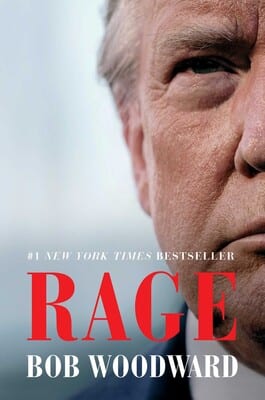
Any journalist in the United States is likely familiar with the name Bob Woodward. Along with his investigative partner Carl Bernstein, the pair is famous for breaking the story of the Watergate scandal, revealing that President Nixon was involved in the criminal wire-tapping of the Democratic National Committee. Since the 1970s, Woodward and Bernstein have often been idolized in the industry, considered as role models for journalists and providing inspiration to seek truth on behalf of the public good, perhaps even by cracking open the “next Watergate.” Despite his status as a hero-icon, Woodward has recently faced criticism from the very organization he used to work for, The Washington Post, as well as a slew of other journalists and readers (Sullivan, 2020).
What caused this recent criticism? The worries begin with Woodward’s contact with President Trump, specifically in a series of interviews starting in January 2020. This was the same time as the novel coronavirus began to spread in the United States. At the time, Woodward kept the wide-ranging content of those interviews with the President confidential (Sullivan, 2020). Early in the fall, months after the pandemic raged through America, Woodward announced he would be releasing a new book titled Rage, which would detail Trump’s handling of the COVID-19 pandemic. Though the work – finally released for sale in mid-September 2020 – describes a number of troublesome disclosures, the most concerning of all was the revelation that President Trump knew as early as February that the coronavirus was far deadlier than the flu (Sullivan, 2020). Herein lies the controversy, as some are questioning Woodward’s intentions – Why would a journalist, who is supposed to have the public’s best interest in mind, keep this information behind closed doors for months pending the release of a new book? Is this a case of a journalist acting as a greedy author by prioritizing a book release over informing the public, or is there a reasonable explanation why he initially kept this knowledge to himself?
In an interview with The Washington Post, Woodward described his reasons for keeping Trump’s confession to himself rather than release it immediately. In short, Woodward maintained that he could not be sure that anything Trump told him was true (Sullivan, 2020). President Trump has been caught on various occasions not telling the whole truth, and Twitter has even placed fact-check warnings on the President’s tweets (Yen et. al, 2020). Thus, Woodward explained that he needed to find Trump’s sources in order to verify his claims before releasing them, as doing so could have furthered the spread of fake and misleading news in a high-anxiety pandemic environment (Sullivan, 2020). Unfortunately such a task is time-consuming, and Woodward was unable to receive source confirmation until May, around three months later (Sullivan, 2020).
While verification and fact-checking are important aspects of journalism, if Woodard confirmed Trump’s claims in May, some may still wonder: why didn’t he release the information then? Woodward said he chose to write a book about his findings because he thought that would be the best way to convey the “big picture” instead of publishing individual daily stories about each new revelation in real time (Sullivan, 2020). Besides, since most cities throughout the nation implemented lock-downs by mid-March, releasing Trump’s confessions two months later would make little difference. However, even if a book form may be more comprehensive, critics point out that Woodward’s information could have saved lives if he released it earlier (Gangel, 2020). Regardless of institutional actions taken, some believe that individual Americans were slow to adopt personal precautionary measures because Trump downplayed the severity of the coronavirus on multiple occasions. However, had the American people known that Trump secretly believed the virus was deadlier than he claimed in public, they may have listened to the Center for Disease Control’s recommendations much sooner (Robert Costa, 2020). As Margaret Sullivan, a reporter at the New York Times, argues: “The chance –even if it’s a slim chance– that those revelations could have saved lives is a powerful argument against waiting this long” (Sullivan, 2020).
Did Woodward withhold information in the noble pursuit of fact-checking, or for personal gain to sell more copies of his book? While it is impossible to ascertain his true intentions, and there is nothing that can undo his past actions, Woodward’s publication of Rage nonetheless presents an opportunity to question ethical decision making regarding the release or retaining of information in journalism. It also leads to questions about the choices journalists make in presenting the best stories and the stories that are timed to help the public the most. Should journalists cut corners, or at least forgo the exposure and detail of a slow-moving book project, if there’s a chance to help the public in times of extraordinary crisis? Even when writing smaller pieces such as articles, one can sense a tension between processes of fact-checking and extra investigation that might delay life-saving information from a public that could benefit from it. How are journalists like Woodward supposed to navigate the tensions between speech and thoroughness, profit and effect, in the purpose of stories so crucial for the American public?
Discussion Questions:
- What values or interests are in conflict in the controversy surrounding Woodward’s release of his book?
- Should journalists have the authority to withhold information based on their own discretion or do they have an obligation to inform the public as quickly as possible? Are there any times that a journalist is ethically allowed to withhold truthful information from the public?
- If journalists choose to release information as soon as possible to the public, what costs or potential harms might accompany this strategy?
- What should Woodward have done, and is there a way that he could have creatively upheld his duty to the public and his desire to publish a detailed book?
- What guidelines would you suggest journalists follow in times of crisis such as a pandemic? Should fact-checking and verification processes be relaxed in favor getting information out sooner, or does doing so only increase the risk of spreading fake news?
Further Information:
Center for Disease Control and Prevention. (2020, January 21). “First Travel-related Case of 2019 Novel Coronavirus Detected in United States.” Centers for Disease Control and Prevention. Available at: https://www.cdc.gov/media/releases/2020/p0121-novel-coronavirus-travel-case.html
Gangel, J. (2020, August 13). “CNN Exclusive: Details, title and cover revealed for Bob Woodward’s upcoming book on Trump.” CNN. Available at: https://www.cnn.com/2020/08/12/politics/bob-woodward-book-trump/index.html
Robert Costa, P. (2020, September 10). “Woodward book: Trump says he knew coronavirus was ‘deadly’ and worse than the flu while intentionally misleading Americans.” The Washington Post. Available at: https://www.washingtonpost.com/politics/bob-woodward-rage-book-trump/2020/09/09/0368fe3c-efd2-11ea-b4bc-3a2098fc73d4_story.html
Sullivan, M. (2020, September 10). “Perspective | Should Bob Woodward have reported Trump’s virus revelations sooner? Here’s how he defends his decision.” The Washington Post. Available at: https://www.washingtonpost.com/lifestyle/media/should-bob-woodward-have-reported-trumps-virus-revelations-sooner-heres-how-he-defends-his-decision/2020/09/09/6bd7fc32-f2d1-11ea-b796-2dd09962649c_story.html?hpid=hp_hp-top-table-high_sullivan-620pm%3Ahomepage%2Fstory-ans
Yen, H., Woodward, C., & Lemire, J. (2020, October 12). “AP FACT CHECK: Trump’s shaky claims on virus, Dem misfires.” Associated Press. Available at: https://apnews.com/article/election-2020-ap-fact-check-donald-trump-campaigns-global-trade-879ab35877ba3d3b5f43435ba7b2d568
Authors:
Claire Coburn, Kat Williams, and Scott R. Stroud, Ph.D.
Media Ethics Initiative
Center for Media Engagement
University of Texas at Austin
December 21, 2020
Image: Simon & Shuster
This case study is supported by funding from the John S. and James L. Knight Foundation. It can be used in unmodified PDF form for classroom or educational settings. For use in publications such as textbooks, readers, and other works, please contact the Center for Media Engagement.
Ethics Case Study © 2020 by Center for Media Engagement is licensed under CC BY-NC-SA 4.0




